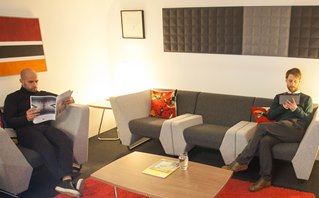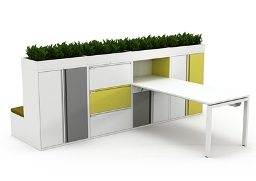HR's valuable role in 'humanising' our workplaces
Our wellbeing is inextricably linked to our surroundings and goes beyond just our physical health. It embraces something much more difficult to quantify - how we feel. Failure to properly understand wellbeing leads many companies to pursue cringeworthy 'coolness', rather than a genuine attempt at creating happy, healthy and productive workplaces. Organisations must remember what is at the core of the wellbeing agenda: the need to ‘humanise’ the work environment.
This is where the HR department can contribute their expertise. The long term viability of a workplace strategy would greatly benefit from understanding and even profiling the individuals that make up the organisation. A workplace that that is best suited to the human needs of those who inhabit it must cater for differences in personal preferences around where, and how people are most productive. Being able to choose from a variety of settings allows individuals or groups to select the environment that best fits the task at hand and their preferred way of undertaking it. In order to create the optimal workplace and ensure maximum ROI, facilities managers, senior management and HR must come together at the planning stage of a relocation or refurbishment, rather than trying to retrofit an established, rigid office layout. They must define the organisational culture they wish to nurture, understand the expectations of their employees and outline budgetary and real estate constraints. By asking the right questions, HR can refine these priorities, and incorporate the following factors into an office design that maximises staff wellbeing:
Active design – ergonomic furniture and a layout that encourages movement
Air quality - including ventilation, humidity and temperature control
Natural and artificial lighting – including light emitted from screens
Acoustics and sound pollution – encouraging social interaction while minimising unwanted disruptions and distractions
Biophilia – bringing nature into the built environment, views outside the building and other connections to the biosphere
Aesthetics – decor, colour and art in the workplace can instil a sense of stability and pride
Environs – the neighbourhood around the office plays a strong role in setting expectations of the facilities within it
Here are 5 easy and often inexpensive ways to improve wellbeing for office-based workers:
Greenery - plants and flowers (biophelia) in the office can increase happiness and productivity, so look at adding some pot plants or configuring our storage with planter boxes
Art - a good selection of art can help people feel calmer, more welcome, less overwhelmed or even reminded of natural beauty in an urban environment - as we explore with our Art at Work programme
Refreshments - offering staff and visitors healthy fresh & dried fruit, almonds and even popcorn can lead to improved alertness as well as better physical health; a selection of teas can provide an alternative to coffee for those wanting to minimise daily caffeine intake
Standing - sitting down actually puts more pressure on the spine than standing, but the important factor is movement - walking around, taking regular breaks and alternating from a sitting to standing position are shown to benefit wellbeing in many ways, especially over a long term
Quiet areas - designating areas away from the main, often noisy open office gives people, particularly introverts, somewhere to relax and recharge or offer somewhere to do some focused reading. SerenadeSE conference tables and Take5 chairs complemented beautifully by large abstract paintings in calming blue tones
SerenadeSE conference tables and Take5 chairs complemented beautifully by large abstract paintings in calming blue tones
 Sofas and coffee tables can be added to a quieter part of the office, for relaxation or informal meeting spaces
Sofas and coffee tables can be added to a quieter part of the office, for relaxation or informal meeting spaces
 UniteSE storage can be configured with planter boxes
UniteSE storage can be configured with planter boxes